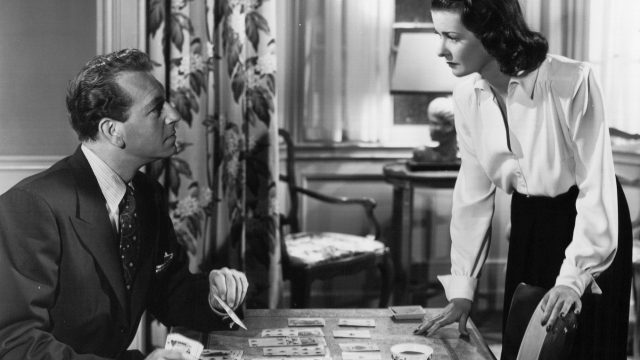Steve Sekely’s Hollow Triumph was originally called The Man Who Murdered Himself, and I submit that it should have stayed that way: the film is most enjoyable when it’s leaning into its contrivance, not its themes.
Paul Henreid stars as John Müller, a dour and monstrously self-centered crook who, after being released from prison, immediately sets about ruining his friends’ lives. They’ve mostly cleaned up their acts while he’s been inside, and the ones who haven’t are used to taking only measured risks. Müller wheedles them all into a team-up to rob a casino owned by the cruel, vindictive, relentless Stansyck, whose appetite for retaliation is legendary. The job goes south, and Müller is the only one to escape alive. He doesn’t feel particularly guilty about that, nor does he seem to have the kind of jittery, enlivening paranoia you’d expect of someone in his position. His initial master plan for avoiding detection is to … move closer to his brother and use him as an “in” for a legitimate job. Ah, near your only family! Truly, no one will think to look for you there!
Müller then discovers that he looks exactly like a local psychologist, Bartok–the only difference is a minor scar on Bartok’s cheek. Clearly, he must kill Bartok and assume his identity, whereupon he will be forever shielded as long as Stansyck’s men, uh, give “Bartok” the chance to produce both some ID and a parade of witnesses verifying “his” life. This is ultimately another shortsighted plan, but since it’s the central conceit of the movie and a lot more fun than watching an unpleasant man work a desk job, I’m willing to go along with it.
This is the best stretch of the film. This is technically noir, but it lacks most of the genre’s flair–no instantly memorable dialogue, few shadowy stylistic flourishes, and a downfall you wait for impatiently rather than with mingled dread and anticipation. Its strengths are more those of a procedural, and so it naturally shines when it gets to revel in the process of Müller becoming Bartok. It has a good appreciation for how vague people’s memories can be and how easily the smallest mishaps can have large consequences. Admittedly, it doesn’t always show that appreciation in the most artful way–one plot point involving a reverse negative might as well be delivered with the characters looking directly at the camera and slowly explaining things to the audience–but it’s still entertaining. We’re watching the dominoes get set up, and we can already feel how they might come down.
This part of the movie also introduces the best character, Bartok’s secretary, Evelyn (Joan Bennett), who isn’t quite as cynical as she wants to be. Müller draws her into a relationship, using her even as he’s purportedly falling for her in his own cold way. She doesn’t get as much to do in the film as I would like, but she’s a very welcome presence who genuinely comes across as someone with her own concerns and inner life.
Unfortunately, after a quick setup and a reasonably strong procedural stretch, Hollow Triumph lives up to its name. There are complications after Müller succeeds with his plan, but they’re stretched out by too-languid pacing, and they’re not interesting enough to make up for how little we care about Müller himself. As good as Henreid can be elsewhere, he falls utterly flat here; he’s a black hole sucking all the charisma off the screen. His rise and fall are hollow for us long before they turn sour for him, and we feel every minute of that time. It’s hard to forgive an 83-minute film for still feeling too long.
Hollow Triumph is streaming on Amazon Prime.


